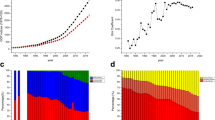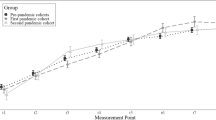Abstract
The paper examines the way the national higher education entryexaminations in Greece are used to determine entry into the 100 percentgovernment-controlled state tertiary education system. The databaserefers to the population of all secondary education graduates taking (ornot taking) the June 2000 national secondary school examination. Thereis considerable achievement variation across regions and types ofschool. Poor districts, evening schools, and state schools areassociated with lower achievement. Private schools are associated withhigher achievement, even controlling for parental schooling and wealth.Regardless of the student's achievement in the national examinations,entry each year is mainly determined by the number of available places.Given the fact the state cannot afford to provide free access to allthose who want entry, the non-university cycle has expanded rapidly toaccommodate a greater number of students into ``higher educationtechnological institutes'' that are most frequently not the candidates'first choice. Thus, the fable of Procrustes is revived in modernGreece.
Similar content being viewed by others
References
Eurostat (2001). Yearbook 2001. Brussels.
Haniotis, G. (1968). 'The situation of universities in Greece', Minerva 6(2) (Winter 1968), 163–184.
Kalamatianou, A.G., Karmas, C.A. and Lianos, T.P. (1988). 'Technical higher education in Greece', European Journal of Education 23(3), 271–279.
Kostakis, A. (1987). 'Differences among school outputs and educational production functions', Sociology of Education 60(4), 232–241.
OECD (2001). Education at a Glance. Paris.
Pantelouris, E.M. (1978). 'Greek orthodoxy', Nature 271(2) (February 1978), 394–395.
Papas, G. and Psacharopoulos, G. (1987). 'The transition from school to the university under restricted entry: A Greek tracer study', Higher Education 16(4), 481–501.
Papas, G. and Psacharopoulos, G. (1991). 'The determinants of educational achievement in Greece', Studies in Educational Evaluation 17, 405–418.
Papas, G. and Psacharopoulos, G. (1993). 'Student selection for higher education: The relationship between internal and external Marks', Studies in Educational Evaluation 19(4), 397–402.
Pesmazoglu, S. (1994). 'Government, ideology and the university curriculum in Greece', European Journal of Education 29(3), 291–304.
Psacharopoulos, G. (1988). 'Efficiency and equity in Greek higher education', Minerva 26(2) (Summer 1988), 119–137.
Psacharopoulos, G. (1995). 'Education in Greece today: Contributions to the perennial debate, introduction', Journal of Modern Greek Studies 13(2) (October 1995), 169–178.
Author information
Authors and Affiliations
Corresponding author
Rights and permissions
About this article
Cite this article
Psacharopoulos, G., Tassoulas, S. Achievement at the higher education entry examinations in Greece: A Procrustean approach. Higher Education 47, 241–252 (2004). https://doi.org/10.1023/B:HIGH.0000016444.59253.a6
Issue Date:
DOI: https://doi.org/10.1023/B:HIGH.0000016444.59253.a6




